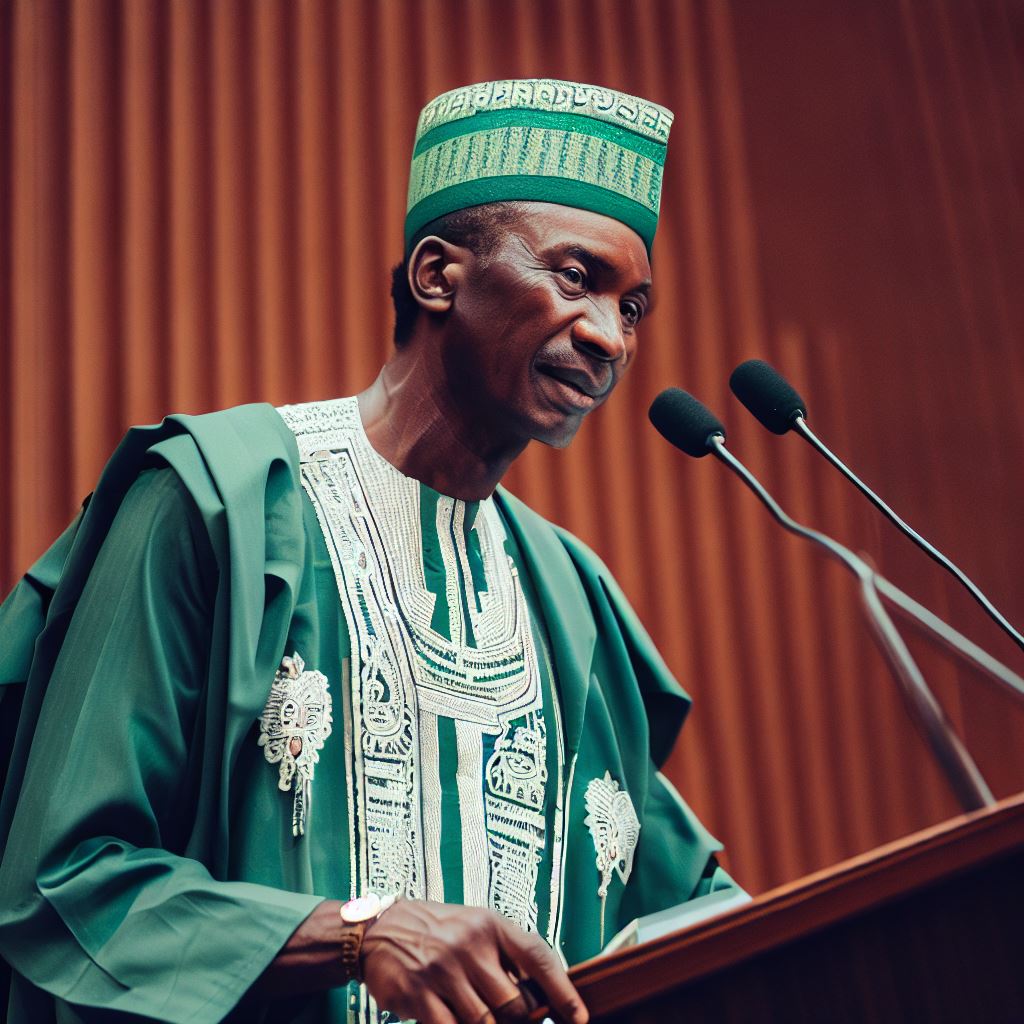Introduction
Political offices in Nigeria play a crucial role in shaping the country’s governance and policies.
Understanding the transition from local to national offices is of utmost importance for a comprehensive analysis of Nigeria’s political landscape.
This post aims to provide a brief overview of political offices in Nigeria, highlighting the significance of this transition.
Overview of Nigeria’s Political System
Nigeria’s federal republic system
Nigeria’s federal republic system is a combination of democratic and federal principles. It is divided into three separate but interdependent branches: the executive, legislative, and judiciary.
The President, as the head of state and government, holds the highest political office in Nigeria. The executive power is vested in the President, who is elected for a four-year term and can be re-elected once.
The legislative branch consists of a bicameral National Assembly, which includes the Senate and the House of Representatives.
The Senate is made up of 109 members, while the House of Representatives has 360 members, both elected by the people.
The judiciary is independent of the executive and legislative branches, ensuring checks and balances.
Nigeria follows a multi-party system, with the All Progressives Congress (APC) and the People’s Democratic Party (PDP) being the dominant parties.
Key features of the political landscape
The political landscape of Nigeria is characterized by regionalism and identity politics. Regionalism refers to the division of politics based on different geographical zones, ethnicities, and religions.
Ethnic diversity is a significant factor in Nigeria’s politics, with over 250 ethnic groups and various religious affiliations.
These factors often shape political alliances, party compositions, and electoral strategies.
Elections are held at the federal, state, and local levels, allowing for representation and participation at different levels of government.
The federal government has power over defense, foreign affairs, currency, and other national issues.
State governments have authority over education, health, transportation, and other issues that affect their respective states.
Local governments handle local administration and grassroots development. Nigeria has a system of revenue allocation, where resources are shared among the federal, state, and local governments.
Oil revenue plays a significant role in Nigeria’s political economy, as the country is a major oil producer. Corruption remains a major challenge in Nigeria’s political system, affecting governance and public trust.
Efforts have been made to combat corruption through institutions like the Economic and Financial Crimes Commission (EFCC).
Despite challenges, Nigeria’s political system has witnessed peaceful transitions of power and democratic progress.
Civil society organizations and media play a crucial role in monitoring the government and advocating for accountability.
The role of women in Nigeria’s political landscape is gradually increasing, although more progress is needed.
Electoral reforms and increased youth participation are ongoing debates in Nigeria’s political system.
In the end, Nigeria’s political system is a federal republic characterized by a combination of democratic and federal principles.
The executive, legislative, and judiciary branches ensure checks and balances, while regionalism and identity politics shape the political landscape.
Read: The Political Economy: Nigeria’s Leaders and Policies
Local Political Offices in Nigeria
Local political offices in Nigeria hold great significance in the overall political structure of the country. These offices play a crucial role in decision-making processes and governance at the grassroots level.
Let’s delve into the definition and importance of local political offices in Nigeria, explore their roles and responsibilities, and also examine the electoral process for these offices.
Definition and Significance of Local Political Offices
- Local political offices refer to positions of power and authority at the sub-national level within Nigeria.
- They are vital in promoting democratic participation and ensuring grassroots representation.
- These offices execute policies, implement programs, and manage resources at the local level.
- They play a crucial role in bringing government closer to the people and addressing local needs and concerns.
- Local political offices contribute to effective governance and socio-economic development in Nigeria.
Roles and Responsibilities at the Local Level
- Local political offices are responsible for maintaining law and order within their jurisdiction.
- They oversee the delivery of basic amenities such as water, electricity, and healthcare.
- These offices formulate and implement policies related to education and infrastructure development.
- Local political officeholders also facilitate community development initiatives and represent their constituents’ interests.
- They serve as intermediaries between the people and higher levels of government.
The Process of Elections for Local Political Offices
- Elections for local political offices in Nigeria are conducted periodically.
- The Independent National Electoral Commission (INEC) is responsible for overseeing these elections.
- Aspiring candidates must meet eligibility criteria, including age and educational qualifications, to participate.
- Political parties nominate candidates for various local offices, including councilors and local government chairpersons.
- Campaigns are conducted to communicate candidates’ policies and garner support from constituents.
- On the election day, eligible voters cast their votes in designated polling stations.
- Counting of votes and collation of results take place, followed by the declaration of winners.
- Political officeholders at the local level assume their roles and responsibilities after being sworn into office.
In fact, local political offices in Nigeria hold immense importance in the political landscape of the country.
Their roles and responsibilities contribute to the overall governance and development at the grassroots level.
The electoral process allows for the selection of capable individuals who will represent and serve their communities effectively.
These local political offices are vital for democracy and ensuring the needs and concerns of the people are addressed.
Read: Youth in Nigerian Politics: A New Era of Leadership
From Local to National: The Pathway
Transitioning from local to national political offices in Nigeria is a journey filled with challenges, opportunities, and careful maneuvering.
It requires a strategic approach, strong connections, and the ability to navigate the complex political landscape.
Exploration of How Individuals Transition
Transitioning from local to national political offices demands a strong foundation at the local level. It begins with individuals gaining significant experience and building a reputation within their local communities.
This pathway involves individuals starting their political careers by holding various local offices, such as councilors, mayors, or state representatives.
These positions allow them to understand the intricacies of governance and build a network of supporters.
As politicians gain prominence at the local level, they often start exploring opportunities in higher political offices.
They may run for positions such as governors or national legislators, aiming to represent their constituencies on a broader scale.
Factors Contributing to Successful Transition
Successful transition from local to national political offices in Nigeria requires several key factors:
- Strong political networks: Building relationships with influential politicians and party leaders is vital for gaining support and endorsement.
- Strategic alliances: Forming alliances with other politicians can increase chances of success in transitioning to a higher office.
- Political party affiliation: Being a member of a prominent political party can provide access to resources and a wider voter base.
- Public perception and popularity: A positive public image and popularity among constituents can significantly boost the chances of winning a national office.
- Effective communication skills: The ability to articulate ideas, connect with voters, and deliver persuasive speeches is crucial in attracting support.
Case Studies and Examples
Several Nigerian politicians have successfully transitioned from local to national political offices, demonstrating the effectiveness of the pathway:
- Bola Tinubu: A former governor of Lagos State, Tinubu made a successful transition to national politics.
He later became a prominent figure in the Nigerian Senate and played a vital role in the formation of the All Progressives Congress (APC). - Aminu Tambuwal: Tambuwal started his political career as a councilor and later became Speaker of the House of Representatives.
He then successfully ran for the governorship of Sokoto State, showcasing a remarkable transition from local to national offices. - Bukola Saraki: Saraki served as governor of Kwara State before successfully transitioning to the Senate, where he became Senate President and played a significant role in shaping national politics.
These case studies highlight the potential for Nigerian politicians to make a successful journey from local to national political offices.
They demonstrate that with the right strategy, political acumen, and support, individuals can navigate the pathway to higher levels of governance.
In review, transitioning from local to national political offices in Nigeria requires careful planning, extensive networking, and astute political maneuvering.
Factors such as strong local foundations, political alliances, party affiliation, public perception, and effective communication skills contribute to successful transitions.
Case studies of politicians like Bola Tinubu, Aminu Tambuwal, and Bukola Saraki exemplify the possible outcomes of the pathway.
As Nigeria’s political landscape evolves, aspiring politicians must navigate these challenges and opportunities to make their mark on the national stage.
Read: Nigeria’s Political Landscape: A 2023 Outlook

Challenges and Benefits of Transitioning
In Nigeria, politicians transitioning from local to national offices face numerous challenges and also have the opportunity to tap into various benefits.
This section will discuss the hurdles faced by political figures in this transition as well as the advantages and opportunities that come with it.
Challenges Faced by Politicians Transitioning from Local to National Offices
- Increased competition: Transitioning to a national office means facing more experienced and well-established politicians.
- Lack of national recognition: Local politicians often struggle to gain recognition on a national scale, making it harder to build support.
- Difficulty in navigating larger constituencies: National offices require politicians to cater to a larger and diverse group of constituents, posing challenges in effectively representing them.
- Fierce party politics: Transitioning politicians must navigate complex party dynamics and loyalties at the national level.
- Intense public scrutiny: As politicians transition to national offices, they become subject to heightened public scrutiny and media attention.
- Higher expectations: The electorate expects more from politicians in national offices, placing added pressure to deliver on promises.
- Financial constraints: Running campaigns for national offices often require more financial resources, which may pose a challenge for politicians transitioning.
- Establishing new networks: Transitioning politicians need to build new networks and alliances at the national level.
- Policy adaptation: The shift from local to national politics requires politicians to understand and address broader national issues.
- Public perception: Local politicians transitioning to national offices may face skepticism and mistrust from the public.
Benefits and Opportunities of Transitioning from Local to National Offices
- Platform for greater impact: National offices provide politicians with a wider platform to advocate for change and make a significant impact.
- Access to more resources: Serving in national offices grants access to increased resources, allowing politicians to implement larger-scale projects.
- Influence on national policies: Transitioning politicians have the opportunity to shape and influence policies that affect the entire country.
- Enhanced networking opportunities: National offices offer politicians the chance to connect with influential individuals and organizations on a larger scale.
- Increased national recognition: Successfully transitioning to a national office can enhance a politician’s visibility and reputation nationwide.
- Expanded sphere of influence: Transitioning politicians can expand their sphere of influence beyond their local constituency, leading to more significant political clout.
- Professional growth and development: Navigating the challenges of transitioning to a national office can enhance a politician’s skills and abilities.
- Broader understanding of national issues: Serving in a national office exposes politicians to a wider range of national issues, improving their understanding of the country’s complexities.
- Opportunity to address systemic problems: Transitioning politicians can tackle systemic issues that are beyond the scope of local offices, working towards meaningful change.
- Potential for future advancement: Transitioning successfully to a national office can open doors for further political advancement and leadership roles.
Despite the challenges, transitioning from local to national offices in Nigeria presents politicians with a significant opportunity for growth, impact, and national service.
While the road may be challenging, the benefits and opportunities that come with this transition can make it a worthwhile endeavor for those willing to undertake it.
Read: The Influence of Traditional Leaders in Nigerian Politics
Impact on National Politics
Analysis of the influence of politicians with local backgrounds on national politics
Politicians with local backgrounds bring unique perspectives and experiences to the national political arena.
Their understanding of local issues and challenges can provide valuable insights in crafting national policies.
They often advocate for the interests and needs of their constituents, ensuring their voices are represented.
These politicians have the ability to connect with local communities and bring grassroots issues to the forefront.
A diverse range of perspectives is crucial for a healthy democracy and effective governance.
How local experiences shape policies and decision-making at the national level
Local experiences often shape the policies and decisions made at the national level.
Politicians who have faced specific local challenges are more likely to propose effective solutions.
They can draw from their firsthand experiences to address issues such as infrastructure, education, and healthcare.
By understanding the unique needs of their communities, they can implement policies that truly make a difference.
This ensures that national policies cater to local realities and have a positive impact.
The importance of diverse representation in national politics
Diverse representation in national politics is essential for a fair and inclusive society.
When politicians with local backgrounds are elected to national offices, a broader range of perspectives is represented.
This leads to policies that consider the needs and interests of various communities.
Having diverse representation also fosters trust and legitimacy in the political system.
It helps marginalized groups feel acknowledged and ensures their concerns are not ignored.
Furthermore, diverse representation promotes a more equitable distribution of resources and opportunities.
In conclusion, politicians with local backgrounds have a significant impact on national politics.
Their unique experiences and perspectives shape policies and decision-making at the national level.
Diverse representation in politics is crucial for effective governance and a fair society.
By including politicians with local backgrounds, we create a more inclusive and representative political system.
Conclusion
This blog post discussed the transition from local to national political offices in Nigeria. We emphasized the importance of understanding this transition in Nigeria’s political landscape.
Throughout the blog, we highlighted key points such as the significance of local government in Nigeria, the role of traditional rulers, and the challenges faced in the transition to national offices.
It is crucial to recognize that local government serves as the foundation for national governance.
Furthermore, understanding the transition from local to national offices in Nigeria is essential for comprehending the complexity of the country’s political system.
Without this understanding, it becomes challenging to navigate the intricacies and challenges at a national level.
By delving into the importance of this transition, we hope to encourage readers to develop a deeper understanding of Nigeria’s political landscape.
This understanding will enable individuals to make informed decisions, participate in the democratic process, and contribute to the improvement of the nation.
The transition from local to national political offices in Nigeria is a crucial aspect of the country’s governance and should be studied and understood by all citizens.
By doing so, we can foster a more informed and engaged society that actively contributes to Nigeria’s political development.




